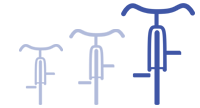SACOG Active Transportation Programs
Active Transportation Program – California Department of Transportation
Cities, counties, tribes, MPOs, transit agencies, school districts, and nonprofits (recreational trails only).
Capital improvement projects including sidewalks, bike lanes, trails, safe routes to school programs, and pedestrian and bicycle plans. Education, encouragement, and enforcement non-infrastructure projects.
Call for proposals typically announced every other year. The most recent application period closed on September 15, 2020.
$440 million statewide in the current 2021 Cycle 5. Priority is given to disadvantaged communities.

Small, Medium, and Large

High
61 out of 554 proposals funded in the competitive statewide component, including small urban and rural projects. 59 projects were funded as part of the Metropolitan Planning Organization (MPO) component. (2019)
Affordable Housing and Sustainable Communities Program – Strategic Growth Council
Local governments, transportation and transit agencies, nonprofit and for-profit housing developers, JPAs, K-12 schools, college and university districts, and federally-recognized Native American tribes.
Affordable housing and transportation infrastructure, including active transportation and transit projects and programs that reduce greenhouse gas emissions.
It is anticipated that the next funding round (cycle 6) will open in November 2020, with an application deadline of February 20, 2021.
$550 million is available for Round 5 (FY 2019/2020). The maximum award amount is $30 million (no more than $60 million to a single developer per funding round), with a minimum of $1 million for TOD, ICP and RIPA Project Areas.

Medium to Large

High
26 out of 55 proposals funded in Round 5 (FY 2019/2020).
California River Parkways Grant Program – California Natural Resources Agency
Public agencies and nonprofits.
River parkway projects, including, but not limited to trails for walking and bicycling or other non-motorized recreational activities, picnic areas, biological restoration, restoring natural floodplains and wetlands.
Concept proposals for the most recent funding cycle closed in September 2018.
Approximately $7 million (2018).

Small

Medium
23 out of 52 proposals funded (2015/2016).
Community Change Grants – America Walks
Advocates, organizations, and agencies using innovative, engaging, and inclusive programs and projects to create change at the community level.
Projects that result in an increase in physical activity and active transportation, engage people and organizations which may be unfamiliar with projects and efforts that increase walkability, and projects which demonstrate a culture of health inclusivity for all.
Applications are typically accepted on an annual basis. The the next application cycle will be open from October 5th through November 9th 2020.
$1,500.00 in community stipends (2019).

Small
To be determined
Infill Infrastructure Grant Program for Large Jurisdictions – California Department of Housing and Community Development
Cities and/or counties of over 250,000 that have jurisdiction over a Qualifying Infill Area. Nonprofit or a for-profit developer of a Qualifying Infill Project applying jointly with a city and/or county that has jurisdiction over a Qualifying Infill Project.
Construction of new infill development and rehabilitation of infrastructure that supports higher-density affordable and mixed-income housing including but not limited to active transportation, parks and open space, stormwater, street repair, transit, and water-related improvements.
The most recent application cycle closed in March 2020. The next round of funding is expected to be announced in November 2020.
$194 million available for Round 6 (2020). For Qualifying Infill Projects, the minimum grant award is $1 million ($500,000 for rural areas) with a maximum of $7.5 million. For Qualifying Infill Areas with over 200 units, the minimum grant award is $2 million ($1 million for rural areas). Only one application for each Capital Improvement Project will be funded per funding round.

Small, Medium, and Large

High
40 proposals funded in Round 6 (FY 2019/2020)
Infill Infrastructure Grant Program for Small Jurisdictions – California Department of Housing and Community Development
Cities and/or counties of under 250,000 that have jurisdiction over a Qualifying Infill Area. Nonprofit or a for-profit developer of a Qualifying Infill Project applying jointly with a city and/or county that has jurisdiction over a Qualifying Infill Project.
Construction of new infill development and rehabilitation of infrastructure that supports higher-density affordable and mixed-income housing including but not limited to active transportation, parks and open space, stormwater, street repair, transit, and water-related improvements.
Applications were accepted on an over-the-counter basis as of March 2020, however, all funds have been exhausted.
$85 million available for Round 6 (2020). For Qualifying Infill Projects, the minimum grant award is $1 million ($500,000 for rural areas) with a maximum of $7.5 million. For Qualifying Infill Areas with over 200 units, the minimum grant award is $2 million ($1 million for rural areas). Only one application for each Capital Improvement Project will be funded per funding round.

Small, Medium, and Large

High
21 proposals funded in Round 6 (FY 2019/2020)
Recreational Trails Program – California Department of Parks and Recreation
Cities and counties, districts, state and federal agencies, nonprofits with management responsibilities of public lands.
Recreational trails and trails-related projects.
Applications are typically accepted on an annual basis. The most recent application deadline closed in February 2020.
$1.7 million annually.
To be determined
To be determined
Regional Parks Program (Proposition 68) – California Department of Parks and Recreation
Counties, regional park districts, special districts, joint powers authorities, and nonprofits.
Acquisition for new or enhanced public access and use. Development to create or renovate multiuse trails, regional sports complexes, visitor and other support facilities.
To be announced following adoption program guidelines. It is anticipated that the application period will open no sooner than 2021.
Upon appropriation by the California State Legislature, it is anticipated that $23,125,000 will be available for competitive grants. The minimum grant award is $200,000, with a maximum award of $3 million.

Small to Medium
To be determined
Rural Recreation and Tourism Program (Proposition 68) – California Department of Parks and Recreation
Cities, counties, and special districts in nonurbanized areas.
Acquisition and development of new recreational opportunities and facilities in nonurbanized counties with populations of less than 500,000 people and low population densities per square mile.
An application due date will be announced when the application guide is finalized, which is anticipated in the Summer or Fall of 2020. The application due date will not occur before Summer 2021.
Upon appropriation by the California State Legislature, it is anticipated that $23,125,000 will be available for competitive grants. Grant amounts will range from $200,000 – $3,000,000.

Small to Medium
To be determined
Safe Routes to Parks Activating Communities Program – Safe Routes to School National Partnership
Nonprofits.
Safe Routes to Parks action plans and implementation activities such as acquiring rights-of-way, maintenance, and street design.
Applications are typically accepted on an annual basis. The most recent application period closed in December 2019.
Projects were awarded $12,500 each (2020).

Small

Low
8 out of 99 proposals funded (2020). Only 1 project was awarded in the State of California.
Sustainable Transportation Equity Project (STEP) Implementation Grants – California Air Resources Board
Lead applicants include community-based organizations, federally recognized Native American tribes, and local governments. There must be at least a lead applicant and one sub applicant, either of which must include at least one local government and one community-based organization.
Active transportation, fixed-route transit, and shared mobility projects that increase transportation equity in disadvantaged communities.
The most recent application period closed on August 31, 2020.
$17.75 million is available for up to 3 implementation grants that benefit disadvantaged communities in the current funding round (2019/2020).

Medium to Large

Medium
This is the first funding round for this program. Therefore, information regarding competitiveness is not currently available.
Sustainable Transportation Equity Project (STEP) Planning and Capacity Building Grants – California Air Resources Board
Lead applicants include community-based organizations, federally recognized Native American tribes, and local governments. There must be at least a lead applicant and one sub applicant, which must include at least a local government and a community-based organization.
Community and stakeholder engagement for new or existing clean transportation planning, operations, or infrastructure projects, land use or transportation-focused plan development, capacity building to implement new or enhance existing clean transportation planning, operations, or infrastructure projects that increase transportation equity in disadvantaged communities.
The most recent application period closed on August 31, 2020.
$1.75 million is available for planning and capacity building grants in the current funding round (2019/2020).

Small

Medium
This is the first funding round for this program. Therefore, information regarding competitiveness is not currently available.
Sustainable Transportation Planning Grant Program – California Department of Transportation
MPOs, RTPAs, transit agencies, cities, counties, Native American tribal governments, and public transportation entities. Nonprofits, universities and community colleges may apply as sub-applicants.
Studies and plans that reduce single-occupancy vehicle trips, transportation-related GHG emissions, address climate change and/or integrate land use and transportation planning.
Applications are accepted on an annual basis. Typically, a call for proposals is announced in late summer, followed by an application deadline in fall. The most recent funding cycle closed in October 2019.
$29.5 Million (2020/2021).

Small

Low
77 out of 178 proposals funded (FY 2020/21)
Transformative Climate Communities Program Implementation Grant – Strategic Growth Council
CBOs, local governments, nonprofits (including coalitions of associations), philanthropic organizations and foundations, faith-based organizations, community development finance institutions, community development corporations, JPAs, and Native American tribal governments. There must be a minimum of one lead applicant, in addition to co-applicants.
Applicants must implement at least three projects associated with the following strategies: equitable housing and neighborhood development, affordable housing land acquisition, transit access and mobility, solar installation and energy efficiency, water efficiency, recycling and waste management, urban greening and green infrastructure, land conservation, health and well-being. The list of eligible activities and fundable elements are defined in Appendix B of the Round 3 Program Guidelines.
The most recent application period closed in March 2020. Typically, funding is available on an annual basis. However, the next funding round has not yet been announced.
$56.4 million total for two grant awards of $28.2 million for Round 3 (FY 2019/2020).

Large

High
3 out of 4 proposals funded in Round 3 (2019/2020).
Transformative Climate Communities Program Implementation Grant – Strategic Growth Council
CBOs, local governments, nonprofits (including coalitions of associations), philanthropic organizations and foundations, faith-based organizations, community development finance institutions, community development corporations, JPAs, and Native American tribal governments. There must be a minimum of one lead applicant, in addition to co-applicants.
Applicants must implement at least three projects associated with the following strategies: equitable housing and neighborhood development, affordable housing land acquisition, transit access and mobility, solar installation and energy efficiency, water efficiency, recycling and waste management, urban greening and green infrastructure, land conservation, health and well-being. The list of eligible activities and fundable elements are defined in Appendix B of the Round 3 Program Guidelines.
The most recent application period closed in March 2020. Typically, funding is available on an annual basis. However, the next funding round has not yet been announced.
$56.4 million total for two grant awards of $28.2 million for Round 3 (FY 2019/2020).

Large

High
3 out of 4 proposals funded in Round 3 (2019/2020).
